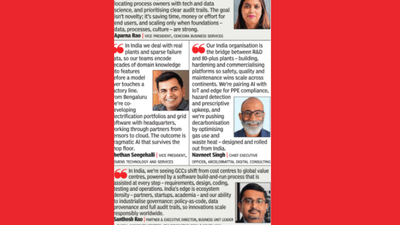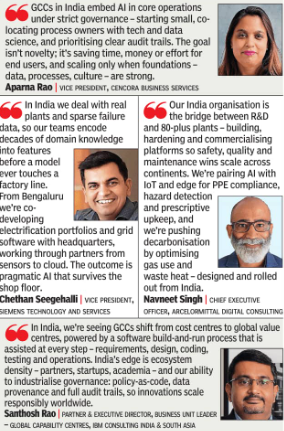ARTICLE AD BOX

In development of practical AI solutions, the locus of innovation is moving to where the talent is. And India, with its wealth of engineers and global capability centres, is the beneficiary of this trend.
That’s what experts who work at some of the leading GCCs in India told us during last week’s webinar held in association with IBM.“Our India-based teams are not writing proofs of concept and handing them off,” said Chethan Seegehalli, VP at Siemens Technology and Services. “We co-develop global products and solutions from here with headquarters and partners, and ship to customers worldwide. The rule we follow on the India floor is simple: AI must be robust, democratised and purposeful.
You can’t put experimental code on a factory line. We design for serviceability over replacement, we build energy-efficient controls for buildings and data centres, and we make software that a field technician and a configuration engineer can both use.
”He added that India’s contribution sits behind strict guardrails. “Our centres work to non-negotiables – accountability, explainability, safety, security, data governance and responsible use.
The clever demo is the easy part, the hard work in India is making it production-grade with those guardrails,” he said.

-
Cutting carbon with software
From heavy industry, the emphasis was on outcomes built and hardened in India. “We don’t pursue AI for AI’s sake,” said Navneet Singh, CEO of ArcelorMittal Digital Consulting, the steelmaker’s in-house technology consulting and delivery arm. “In our India organisation, we combine AI with IoT, cloud and edge and put it to work in the plant.
Computer vision checks basic PPE (personal protective equipment) and helps crane operators in high-heat zones, vision systems catch surface defects earlier on the line, and prescriptive models reduce mean time to repair and increase uptime in operations that must run 24/7,” he said.All of these capabilities have a big impact on the carbon footprint of a steel plant. “If you treat steel plants as a ‘country’, they’d rank among the biggest emitters.
We optimise gas use and waste-heat recovery with AI, and our India teams build and commercialise the platforms so gains can be rolled out across dozens of sites. That is the leverage a GCC here can deliver,” Singh said.Development of agentic AI systems is also occurring at these GCCs, though these powerful capabilities are still being piloted and wired into real workflows from India. “Agents will act inside clearly defined boundaries, and people will supervise exceptions,” said Singh.
“We are running proofs in finance, supply chain and HR with human-in-the-loop. No one is letting an agent post directly into a core ERP until accuracy and trust cross a very high bar and cybersecurity and SOX controls are satisfied.
”A parallel shift is visible in how software is built and governed out of Indian centres, said Santhosh Rao, partner & executive director, business unit leader – GCCs at IBM Consulting India & South Asia.
“We’re moving clients from a standard software development life cycle to an assisted life cycle. From our India teams, the goal is to assist a business analyst to do more, assist a developer to do more, assist a tester to do more – it’s augmentation at scale.
”He stressed that governance comes baked in, which is nonnegotiable when building enterprise-grade software and systems. “Responsible AI is not a checklist; it is a system.
Fairness, robustness, privacy, data quality, provenance and transparency must sit inside the workflow. Clients want to know what data came from where, who changed it and why a model acted as it did. Our India delivery teams operationalise this with policy-as-code, audit trails and controls that run in CI/CD pipelines,” he said.The practical AI work
Cencora is a global healthcare company that distributes pharmaceuticals and provides services – spanning logistics, market access and patient solutions. In India, its GCC acts as a hub for digital and technology services, where process owners sit alongside data scientists and engineering teams to industrialise use-cases under strict governance.
“The work in India is to co-locate process owners, technology teams and data scientists so models are trained on the right problems and change management keeps pace.
The aim is not to chase novelty, it is to make sure AI saves time, money or effort for the end user, and that there is a clear audit trail for every decision,” Rao said.She cautioned against expecting AI to fix weak foundations. “If delivery models are broken or culture is misaligned, AI will only scale the dysfunction. Indian centres are spending as much effort on foundations — data readiness, process quality, talent — as they are on models.”

 3 hours ago
6
3 hours ago
6









 English (US) ·
English (US) ·